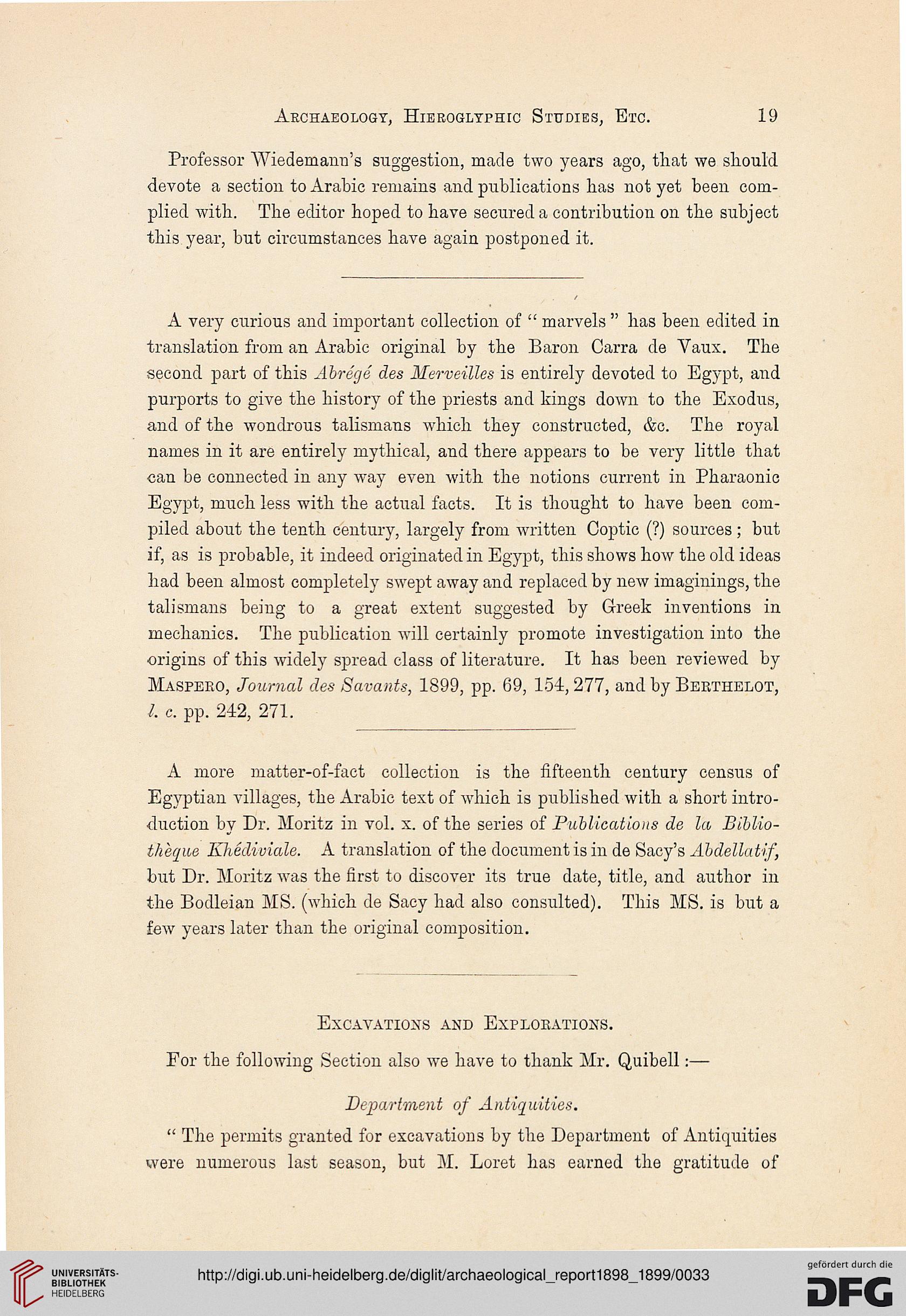Archaeology, Hieroglyphic Studies, Etc.
19
Professor Wiedemann's suggestion, made two years ago, that we should
devote a section to Arabic remains and publications has not yet been com-
plied with. The editor hoped to have secured a contribution on the subject
this year, but circumstances have again postponed it.
A very curious and important collection of " marvels " has been edited in
translation from an Arabic original by the Baron Carra de Vaux. The
second part of this Abrege des Merveilles is entirely devoted to Egypt, and
purports to give the history of the priests and kings down to the Exodus,
and of the wondrous talismans which they constructed, &c. The royal
names in it are entirely mythical, and there appears to be very little that
can be connected in any way even with the notions current in Pharaonic
Egypt, much less with the actual facts. It is thought to have been com-
piled about the tenth century, largely from written Coptic (?) sources; but
if, as is probable, it indeed originated in Egypt, this shows how the old ideas
had been almost completely swept away and replaced by new imaginings, the
talismans being to a great extent suggested by Greek inventions in
mechanics. The publication will certainly promote investigation into the
origins of this widely spread class of literature. It has been reviewed by
Maspero, Journal des Savants, 1899, pp. 69, 154,277, and by Berthelot,
I. c. pp. 242, 271.
A more matter-of-fact collection is the fifteenth century census of
Egyptian villages, the Arabic text of which is published with a short intro-
duction by Dr. Moritz in vol. x. of the series of Publications de la Biblio-
iheque Khediviale. A translation of the document is in de Sacy's Abdellatif,
but Dr. Moritz was the first to discover its true date, title, and author in
the Bodleian MS. (which de Sacy had also consulted). This MS. is but a
few years later than the original composition.
Excavations and Explorations.
For the following Section also we have to thank Mr. Quibell:—
Department of Antiquities.
" The permits granted for excavations by the Department of Antiquities
were numerous last season, but M. Loret has earned the gratitude of
19
Professor Wiedemann's suggestion, made two years ago, that we should
devote a section to Arabic remains and publications has not yet been com-
plied with. The editor hoped to have secured a contribution on the subject
this year, but circumstances have again postponed it.
A very curious and important collection of " marvels " has been edited in
translation from an Arabic original by the Baron Carra de Vaux. The
second part of this Abrege des Merveilles is entirely devoted to Egypt, and
purports to give the history of the priests and kings down to the Exodus,
and of the wondrous talismans which they constructed, &c. The royal
names in it are entirely mythical, and there appears to be very little that
can be connected in any way even with the notions current in Pharaonic
Egypt, much less with the actual facts. It is thought to have been com-
piled about the tenth century, largely from written Coptic (?) sources; but
if, as is probable, it indeed originated in Egypt, this shows how the old ideas
had been almost completely swept away and replaced by new imaginings, the
talismans being to a great extent suggested by Greek inventions in
mechanics. The publication will certainly promote investigation into the
origins of this widely spread class of literature. It has been reviewed by
Maspero, Journal des Savants, 1899, pp. 69, 154,277, and by Berthelot,
I. c. pp. 242, 271.
A more matter-of-fact collection is the fifteenth century census of
Egyptian villages, the Arabic text of which is published with a short intro-
duction by Dr. Moritz in vol. x. of the series of Publications de la Biblio-
iheque Khediviale. A translation of the document is in de Sacy's Abdellatif,
but Dr. Moritz was the first to discover its true date, title, and author in
the Bodleian MS. (which de Sacy had also consulted). This MS. is but a
few years later than the original composition.
Excavations and Explorations.
For the following Section also we have to thank Mr. Quibell:—
Department of Antiquities.
" The permits granted for excavations by the Department of Antiquities
were numerous last season, but M. Loret has earned the gratitude of





